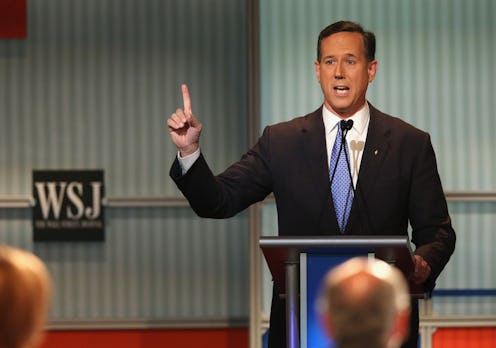News
Which Republican Will Drop Out Next?
The fourth GOP debate was an important one, not just because it provided a platform for the candidates to defend their stances, but because it allowed viewers to judge whether those stances actually made any sense, or whether they were simply bloviating on a subject that they clearly didn't understand. What's more, the WSJ/Fox Business Network showdown served as something of a harbinger of things to come. With the primaries just a few months away, candidates were forced to realize that the debate might very well be their last chance to rally support for their cause. On Tuesday night, it became clear which Republican candidates would likely drop out next and which ones would survive to fight another day.
It could have been a disaster. Several of the GOP candidates entered the evening with a lot weighing on their shoulders, after all. There was Jeb Bush, for whom the last two debates have been epic failures and who needed desperately to cling to his legacy status in order to maintain any credibility going forward. Marco Rubio, too, needed to sustain his image as the party's fresh-faced alternative if he wanted to avoid a major dip in the polls. Businesswoman Carly Fiorina's plan was to regain some of her lost footing since cresting at just under 12 percent in the polls back in late September, lest she suffer the same fate as Scott Walker, slowly becoming irrelevant — or worse, boring.
For the most part, all three of the aforementioned candidates managed to do just that. Despite coming off as a bit unprepared and nervous, Bush largely avoided too much scandal, even managing to get in a few good lines on immigration. He, at one point, told rival Donald Trump his plan to deport more than 11 million illegal immigrants "would send a signal that we're not the kind of country that I know America is." Rubio coasted simply by keeping his mouth shut on issues otherwise controversial in his own campaign and skillfully batting off accusations by Rand Paul that he wasn't a true conservative. Fiorina, for her part, seemed to win the evening by getting back to her aggressive, anti-Hillary Clinton roots and stealing the spotlight whenever possible, much to the chagrin of Trump, who accused her of "interrupting everybody."
The party's top three candidates — Trump, Ben Carson, and Ted Cruz — also managed to hold onto their leads, despite a raucous evening of in-fighting and shaky answers — many of which hinted to the fact that none of them actually knew (or understood) their material as well as their lower-polling counterparts. Even John Kasich was more vocal than usual, coming off as steadier on his feet than Carson and Trump with policies backed by actual numbers.
Unfortunately, the evening didn't bode so well for the remainder of the GOP pack. There was Rand Paul, whose answers about cutting military spending earned him the disdain of much of the audience gathered at the Milwaukee Theater in Milwaukee, Wisconsin. At the earlier undercard debate, Rick Santorum stole the spotlight by unwisely yelling into the microphone at the moderators. ("You know why I respect the Democrats? Because they FIGHT," Santorum shouted, answering a question about infrastructure of all things.) None of the candidates, however, suffered the same vicious fate as Lindsey Graham, who wasn't even invited to the evening's festivities, a fact which he lamented during a live-tweet of the event.
Taking that into account, it's a safe bet that the next heads to roll will be one — if not all — of those three exhausted candidates. If history has shown us anything, it's that the more battles a candidate has to wage, whether over controversial policy (Paul), an overt lack of appeal (Graham), or bizarre behavior (Santorum), the closer he or she slides to the drop-off. One look at former candidates Scott Walker and Rick Perry is all it takes to see that truth.
So while the fourth GOP debate was a victory for some, Paul, Santorum, and Graham have certainly seemed to fall by the wayside. And with a field of 12 other GOP candidates in their way, it's unlikely they'll be able to claw their way back.
